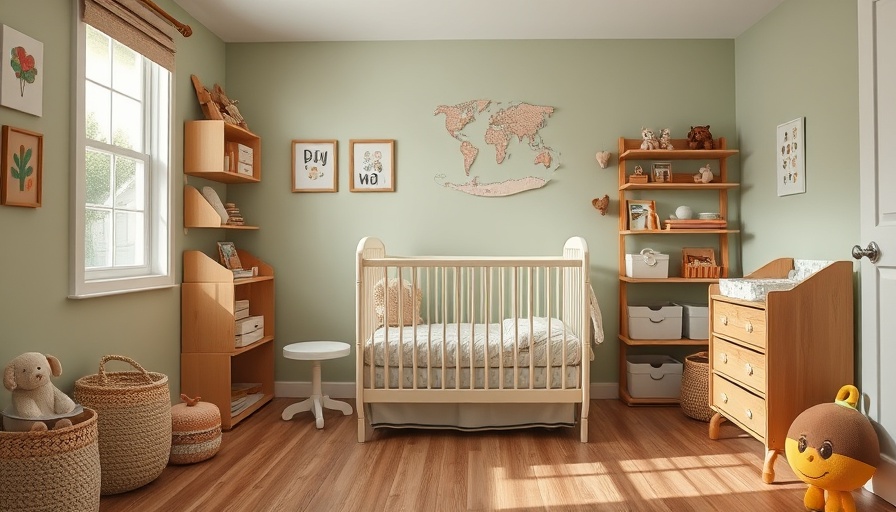
Transform Your Nursery: Smart Organization Ideas for Small Spaces
As the saying goes, "Babies are small, but their belongings are not." For countless families moving into cozy Portland homes, compact Brooklyn apartments, or rentals in thriving Austin, the challenge is substantial—how to manage the avalanche of baby items without losing sanity. Fortunately, with a little creativity and functional design, you can achieve an organized, clutter-free nursery that caters to both your baby’s needs and your living space.
Why Choosing Multifunctional Baby Gear is Essential
Nothing shouts organization louder than a nursery filled with multifunctional gear. Rachel Neill, an industry expert and mother of six, emphasizes the importance of investing in versatile products. "When space is limited, every item has to earn its keep," she states. The typical single-use items often hog precious floor space and create chaos. Instead, opt for pieces that can serve various purposes. For instance, a play couch can double as a play mat or even a makeshift table, allowing parents to maximize utility while keeping the nursery stylish and functional.
Similarly, lifestyle blogger Lisa underscores the need for multi-purpose furniture. In her experience, items like expandable Murphy beds not only add sleeping space but also provide shelves and tables for baby essentials. The evolving trend towards versatility in baby gear is essential for maintaining harmony in small environments.
Maximizing Vertical and Hidden Storage: Tips from the Pros
Effective storage solutions can transform any nursery, particularly when you integrate vertical and hidden options. Professional organizer Jaclyn King from South Norwalk suggests thinking upwards rather than outwards. For example, bins placed under cribs or high shelves can house books and toys, freeing up floors for mobility and play. The appearance of vertical storage doesn't just create a sense of tidiness; it allows your home to breathe and ultimately feel larger.
Moreover, caddies and baskets mounted on the back of doors are clever ways to keep daily essentials handy while keeping floor space clear. Customizable storage options can cater to unique needs, transforming simple walls into functional storage hubs.
Creating Mobile Baby Stations: Stay Flexible!
When it comes to nursery organization, flexibility is vital. By creating mobile baby stations, parents can adapt to different daily needs without compromising space. Portable diaper changing stations can move from room to room, allowing for a variety of activities, whether it’s feeding time, playing, or settling down for a nap.
Having dedicated zones reduces chaos and keeps the day organized. By establishing separate areas for changing, playing, and sleeping, families can streamline their routines and find every necessary item easily. This approach not only creates a smoother experience but also enhances the overall functionality of your nursery.
The Power of Baskets and Bins
Baskets and bins aren’t just trendy—they're practical solutions for organizing toys, clothes, and supplies. By grouping like items together and designating specific storage containers, you can reduce clutter and make tidying up after playtime a breeze. Choose clear bins or labels to streamline the search for specific items, making parenting a little less hectic.
Toy Rotation: Keeping Clutter and Kids in Check
Lastly, toy rotation is a game changer in family nurseries. By limiting the number of toys available at any moment, you can manage not only physical clutter but also keep your child engaged and stimulated. Out-of-sight toys can be rotated back into play when interest wanes, making limited space feel fresh and engaging again.
Conclusion: Practical Tips for Aspiring Homeowners
Transforming your nursery into an organized retreat may seem daunting, but small, thoughtful changes can lead to a spacious and functional design. By investing in multifunctional gear and optimizing your space, you can create an environment that supports both your child's development and your sanity.
As you think about the practical insights and innovative storage solutions above, consider how these ideas can apply to your living space. Don’t forget to explore the market for unique real estate offerings that allow for some functional renovations. Whether you’re utilizing platforms like Zillow or Redfin, each property can be a blank canvas awaiting your transformative touch.
If you're in the process of house hunting or seeking to enhance your living environment, it might be worth consulting with a real estate agent to find homes or rentals that accommodate your growing family.
 Add Row
Add Row  Add
Add 




Write A Comment